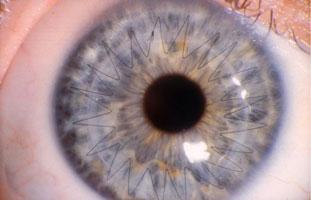 A healthy cornea helps focus light into the eye and is essential to clear vision. If you have suffered damage to your cornea, you may need a corneal transplant. A corneal transplant replaces the diseased cornea with a healthy one from a human donor. A healthy cornea can restore vision and reduce pain. Grand Rapids Ophthalmology is the largest, fully-integrated eye care medical group in the region. This means that we offer the most advanced surgical treatments, including corneal transplants. Our patients are in the best hands.
A healthy cornea helps focus light into the eye and is essential to clear vision. If you have suffered damage to your cornea, you may need a corneal transplant. A corneal transplant replaces the diseased cornea with a healthy one from a human donor. A healthy cornea can restore vision and reduce pain. Grand Rapids Ophthalmology is the largest, fully-integrated eye care medical group in the region. This means that we offer the most advanced surgical treatments, including corneal transplants. Our patients are in the best hands.
Will Corneal Transplant Surgery Improve My Vision?
- Most patients experience vision improvement and decreased pain after healing from a corneal transplant.
- More than 33,000 corneal transplants are performed in the U.S. each year. For uncomplicated transplants, the success rates are over 90%.
Where Does the Healthy Donated Cornea Come From?
The healthy cornea comes from a deceased person. Human donors can specify if they wish to donate their organs to people who need them. Donated corneas are thoroughly tested in a special laboratory to make sure that they are safe and healthy to use.
Are There Different Types of Corneal Transplants?
Yes, there are several different types of transplants that doctors recommend. The type of corneal transplant is based on the needs of each patient. These include the following:
- Penetrating Keratoplasty (PK) or Full Thickness Corneal Transplant. This form of corneal transplant involves removing the entire damaged cornea and replacing it with a healthy new one.
- Deep Anterior Lamellar Keratoplasty or Partial Thickness Corneal Transplant (DALK) is used when only the front and middle parts of the cornea is damaged.
The thin back endothelial layer is kept in place. This surgery is often used for keratoconus patients. - Endothelial Keratoplasty is a partial transplant. Endothelial keratoplasty is used to remove damaged cells from the Descemet’s membrane. The Descemet’s membrane is part of the deep endothelial layer of the cornea. There are two types of surgery, DSEK and DMEK, depending on the thickness of the donor cornea tissue. Each type of corneal transplant has a different risk of organ rejection. They also each have a different recovery time.
Our corneal specialist at Grand Rapids Ophthalmology in Western Michigan will recommend the type of procedure that is best for you. Grand Rapids Ophthalmology has two fellowship trained corneal specialists, Thomas Cowden, MD, and Marcus Muallem, MD.
What Does the Surgery Involve?
When you arrive at Grand Rapids Ophthalmology for your procedure, we will give you numbing eye drops. If you are anxious or nervous, we may provide other medications to keep you calm as well.
During a corneal transplant, most patients are conscious during the procedure but sedated, while a special device is used to keep your eye open.
Your surgeon will place a protective shield over the eye, and the nurse will provide detailed instructions for post-operative care, including:
- Eye drops instructions
- Eyeshield or glasses to protect your eye
- Instructions not to run or press on your eye
- Over-the-counter pain medication recommendations
- The time frame for resuming normal activities
Most patients return for a post-operative appointment on the day after surgery. Patients can expect to see their doctor for frequent checkups during the first year after their procedure. You should expect to see your eye doctor at least annually after the one-year post-operative period.
How Long Does It Take to Recover?
Recovery time depends on the type of corneal transplant procedure performed. In the most extensive surgeries, it can take up to a year to recover. This is also how long it can take to experience the full positive improvements to your vision.
What Are the Possible Complications?
Corneal rejection is a possible complication. The body’s immune system may recognize the presence of a foreign substance and begin to fight it. There are medications that can help prevent total rejection. These medications may interfere with the natural immune response of the body. There are risks of complications in all types of surgeries. Other possible complications of corneal transplant surgery include:
- Infection
- Bleeding
- Increased intraocular pressure
- Detached retina
Your surgeon at Grand Rapids Ophthalmology will discuss the risks and benefits of a corneal transplant and help you make an informed decision about what procedure is best for you.
Schedule an Appointment
Schedule an appointment today to experience the GRO difference. Call 616.588.6598 or click here.





















